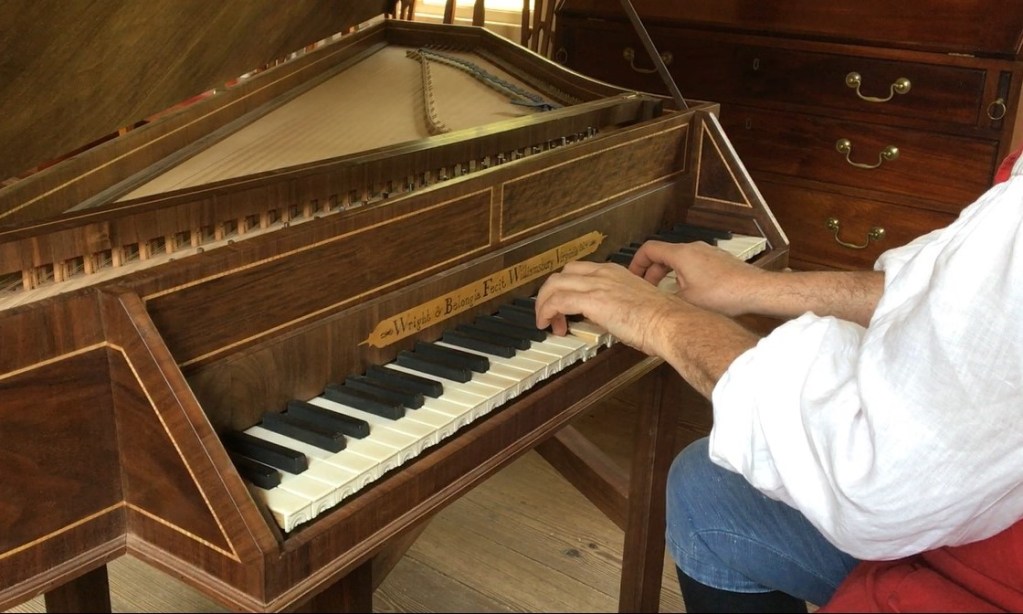Lifestyle
Colonial Williamsburg Crafts Reproduction Harpsichord for Sale

A newly crafted spinet-style harpsichord has been introduced to the Colonial Williamsburg musical instrument collection, and it is currently available for purchase. This handmade reproduction, created by master harpsichord maker Edward Wright and journeyman Melanie Belongia, replicates a 1764 instrument originally made by the London craftsman William Harris. The selling price is set at $21,000.
Wright and Belongia, both skilled tradespeople in Colonial Williamsburg’s cabinetmakers shop, invested approximately 700 labor hours over a two-year period to carefully construct the instrument. “We decided to focus on studying the original instrument and reproducing it,” Wright explained. Their research included an exploration of Harris’s family, who were also involved in harpsichord making.
The spinet’s frame was crafted from white oak and yellow pine, with a walnut and maple veneer. The duo also collaborated on the instrument’s mechanics. In a video presentation, Belongia noted that they might be among the few artisans still practicing this trade using 18th-century techniques.
Wright highlighted the origin of the materials used, stating, “The oak was from stock in the shop for about a year, while the black walnut came from trees on the Colonial Williamsburg property that had been brought down by Hurricane Irene in August 2011.” The keyboard features maple boarding, with keys adorned with white pine levers and bone plating for the naturals, while the accidentals are crafted from black-stained pearwood.
The intricate inlaid decorations and inked inscriptions were completed by Belongia. Unlike the original spinet, which featured ivory key caps, the modern reproduction adheres to current regulations prohibiting the use of ivory. The new instrument bears the inscription: “Wright & Belongia Fecit Williamsburg, Virginia 2024,” echoing the original’s “William Harris Fecit London 1764.”
Wright has documented the project in a paper submitted to a journal in Edinburgh, Scotland, which is currently undergoing peer review. He remarked on the reproduction’s “very mellow, powerful tone,” which has pleasantly surprised those who have had the opportunity to play it. “The players were completely surprised by its tone,” he said, recalling the response at the Historical Keyboard Society of North America’s annual conference last year.
The construction of this spinet was inspired by the renowned sound of Harris’s original instrument. Wright and Belongia’s research revealed that Harris and his brother, Baker, learned their craft from their father, Joseph, making them notable figures in the 18th-century harpsichord-making community.
In his extensive career spanning over 40 years with Colonial Williamsburg, Wright has crafted 15 to 16 new harpsichords. He emphasized the historical significance of these instruments, stating, “It’s worth studying them closely, who made them and who used them.”
The 1764 spinet is recognized as a typical instrument of its time, showcasing the subtle nuances that define each creation. Harpsichords operate using quills that pluck strings, differentiating them from pianos, which use felted hammers. The spinet, a lighter variant of the harpsichord, began its development around 1630, during a period when the piano was still in its infancy.
Wright explained that harpsichord making remains a vital trade at Colonial Williamsburg due to its local historical significance. After Benjamin Bucktrout assumed control of Anthony Hay’s cabinet shop in the mid-1760s, he advertised the production and repair of spinets and harpsichords in the January 15, 1767 edition of The Virginia Gazette.
Since the spinet was made available for sale earlier this month, there has been interest, but no serious inquiries have been made yet. Wright noted, “We’re asking $21,000 (plus tax) based upon our labor and the cost of materials. You need the right people at the right time.” Those interested in acquiring this unique instrument can reach out to Colonial Williamsburg for more details.
For additional insights into harpsichord making at Colonial Williamsburg, visit their YouTube channel or listen to Wright performing on the reproduction spinet via their official Facebook page.
-

 Lifestyle4 months ago
Lifestyle4 months agoLibraries Challenge Rising E-Book Costs Amid Growing Demand
-

 Sports3 months ago
Sports3 months agoTyreek Hill Responds to Tua Tagovailoa’s Comments on Team Dynamics
-

 Sports3 months ago
Sports3 months agoLiverpool Secures Agreement to Sign Young Striker Will Wright
-

 Lifestyle3 months ago
Lifestyle3 months agoSave Your Split Tomatoes: Expert Tips for Gardeners
-

 Lifestyle3 months ago
Lifestyle3 months agoPrincess Beatrice’s Daughter Athena Joins Siblings at London Parade
-

 World3 months ago
World3 months agoWinter Storms Lash New South Wales with Snow, Flood Risks
-

 Science4 months ago
Science4 months agoTrump Administration Moves to Repeal Key Climate Regulation
-

 Science3 months ago
Science3 months agoSan Francisco Hosts Unique Contest to Identify “Performative Males”
-

 Business4 months ago
Business4 months agoSoFi Technologies Shares Slip 2% Following Insider Stock Sale
-

 Science4 months ago
Science4 months agoNew Tool Reveals Link Between Horse Coat Condition and Parasites
-

 Sports4 months ago
Sports4 months agoElon Musk Sculpture Travels From Utah to Yosemite National Park
-

 Science4 months ago
Science4 months agoNew Study Confirms Humans Transported Stonehenge Bluestones









